
10 Nov African Safari
African Safari Vacations
Why Go on an African Safari?
Safari life is vast horizons, open skies, immersing yourself in the wilderness, getting up close and personal with wildlife, meeting people of different cultures and ways of life, and contributing to the conservation of the very places and animals you’ve come to see.
What Is An African Safari?
You may have seen a lion or elephant in an enclosure at a zoo or in a wildlife documentary on the National Geographic channel, but there is a world of difference when you come upon a herd of elephants or a pride of lions in their natural habitat with no fences between you and no commercial breaks to interrupt the action.
A safari is a chance to experience African cultures. Whether through traditional foods that might appear on the menu, or perhaps interacting with local tribespeople, safaris can leave you with a new perspective on life as you witness different ways of living.
Tourism is essential for conservation. It generates much needed income to fund conservation efforts. Park fees contribute to conservation funding, local communities see the financial benefits of conservation, and the presence of tourists also serves as a deterrent to poachers.
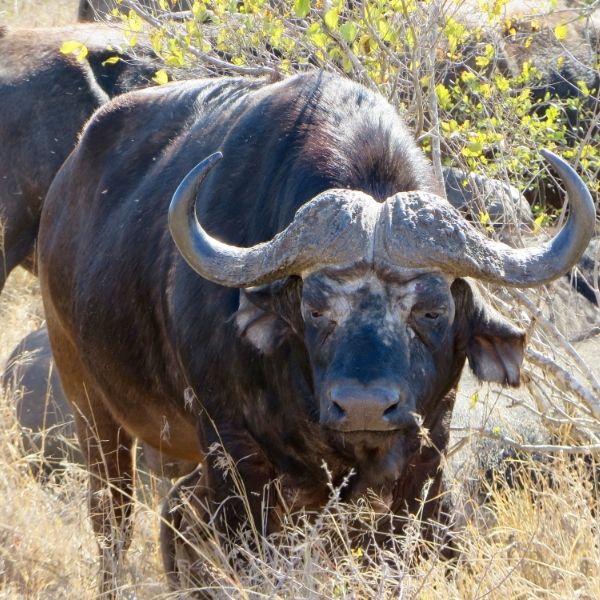
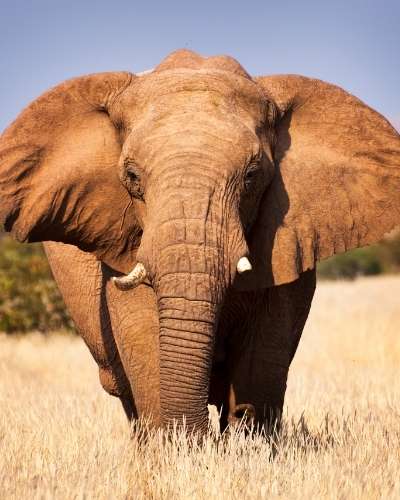
Going on safari is a break from the hustle and bustle of daily life.
It’s a change of scenery, an adventure, and maybe even a culture shock. As the sun rises over the Serengeti or sinks below the horizon in the Okavango, you will catch your breath and embrace the silence of these moments, knowing they will remain in your memory long after you have returned home.
From exclusive five-star lodges to navigating your own 4×4 on a personal odyssey, a safari can be anything you want it to be – with the right planning and research. Kruger Park in South Africa, for instance, has largely tarred roads and fenced camps for the more conservative travelers.
On the other end of the spectrum, those looking for more adventure can explore areas with no roads at all, with activities that could take you trekking for gorillas, paddling wild rivers, or walking in the wilderness.
Interested in active safaris? You can choose from walking safaris, horse safaris, cycling safaris, running on safari, and blue safaris.
What Types of Safari Accommodations Are There In Africa?
Accommodations in Africa have a diversity that stretches the imagination. They include:
Adventure Camping
Adventure camping requires guests to assist with general camp duties. Guides provide assistance, but the essential part of this type of safari is participation – from putting up your tent and packing the vehicle to basic meal preparation duties such as chopping vegetables or stirring a pot. You stay at designated camping sites inside and outside of the national parks. The comforts, fittings, and facilities vary from one site to another. For example, the campsites in the national parks may have only basic sanitation and sometimes no running water (Serengeti) while some campsites have swimming pools and well-stocked bars.
Fully-Assisted Camping
Fully-assisted camping is the modern-day version of the “traditional” safari. The ox-wagons and bearers have been replaced with custom-made 4×4 safari vehicles and professional guides, but you have your private mobile camp, personal staff, chef, waiter and support crew, home cooked meals, and bathrooms inside your spacious tent. Improvements in modern camp equipment, lighting, refrigeration, and hot water allow a quality lifestyle under canvas in the wilds of Africa.
Safari Lodges
Safari lodges vary dramatically in size and style. Most lodges, especially in Tanzania and Kenya, accommodate large numbers of people, with some properties having 60+ rooms. These lodges usually have complete facilities such as conference rooms, business centers, and swimming pools. Safari lodge options vary greatly from three to five-star plus.
Tented Camps
Tented camps are generally the best for a true safari experience. Most luxury tented camps are small (between 5 and 20 tents). All tented safari camps feature spacious canvas rooms with real beds and private en-suite bathroom facilities. They often have waiter service, and dining comparable with fine restaurants with 3 course meals. Typically these camps are sold on a fully inclusive meal and activity plan, often with local house beverages included.
Bush/Eco-Tented Camps
These camps run on environmentally sound principles, especially designated to have minimal effect on the environment. These camps do not include any permanent structures and make use of solar power for electricity and eco-friendly charcoal for heating water.
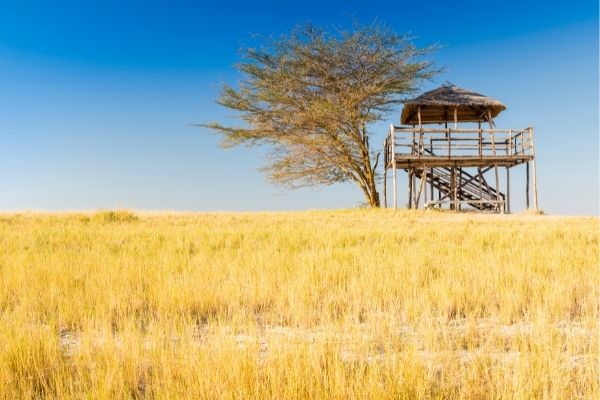
When Is The Best Time To Go On a Safari Tour?
The winter months of June to October offer the best game viewing throughout eastern and southern Africa where winters are generally mild. The best wildlife viewing is when a herd of game graze on the dry Savannah during the day, whilst watering holes and riverheads are the main attraction at sunset.
In the summer months of November to March the bush transforms with lush green vegetation.
The African sky offers up a dramatic backdrop of dark thunderstorm clouds. It is therefore the ideal playing field for energetic grazes with intensified predator action.
It’s also the most popular season for birding enthusiasts with big flocks of migrating birds returning south.
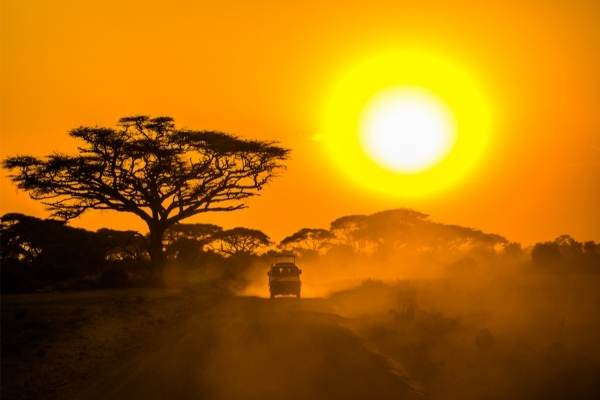
Where To Go On An African Safari?
With numerous countries and dozens of national parks, game reserves, and conservancies to take a safari in, it may seem easiest to just throw a dart at a map of Africa. But a closer look reveals huge differences between the parks – from accessibility to the available species, the type and cost of accommodations, and the option to self-drive or not.
Some parks are better suited to family safaris, with easy access and child-friendly lodges, while others will inspire your inner explorer, with wilderness camping and few other visitors at night.
Seasoned safari fans may be looking beyond the Big Five (lions, elephants, leopards, rhinos, and Cape Buffalo,) seeking out painted dogs or hyenas, or perhaps alternative experiences such as walking or boat safaris.
A safari vacation in Africa is probably the most organized vacation you’ll ever take. While it is possible to fly to a few places (Arusha, Tanzania, or Maun, Botswana) and rent a car to take off into the countryside, few people want to risk being alone on unmarked dirt roads patrolled by hyenas, cheetahs, and lions.
That’s why people choose professionals to curate an itinerary and arrange transportation. At Driftwood Travel we will have a driver waiting for you and from the time you land, you’ll be in the hands of people who will feed and shelter you and take you close to some amazing animals.
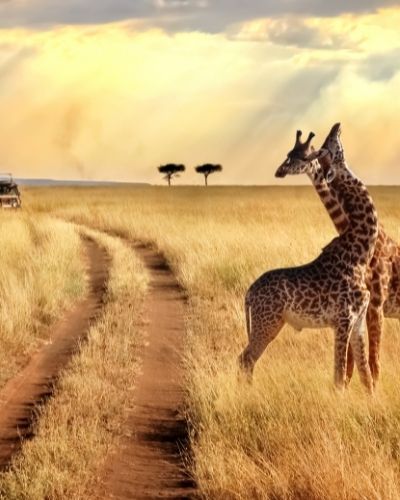
Are You Ready For An Adventure?.
Through our Virtuoso Travel Connections your safari will be designed for you by professional safari guides, managers from some of Africa’s finest safari camps, and people who were born and raised in Africa. That experience guarantees a first class safari experience. Please contact us so we can discuss the many exciting safari adventures that are awaiting you.

